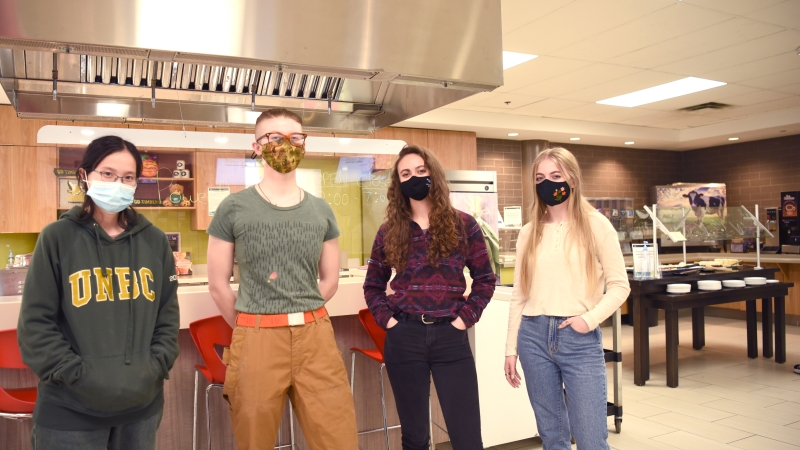Eco-Living Kitchen serving up sustainable food options
The student-led Eco-Living Kitchen group won a prize in the Nourishing Innovation Initiative: Campus Nutrition and Food Security Contest for their Community Cooking on Campus project.

Sustainability, climate change challenges and secure food options in northern B.C. were just some of the top issues a diverse group of students passionate about the north came together to address. While attending UNBC, they formed Eco-Living Kitchen (ELK) in response to a call from the Fraser Basin Council (FBC) for youth between the ages of 16 - 30 to create climate solutions in a province-wide project called Co-Creating a Sustainable BC.
The students, who are all invested in addressing environmental issues, thought it was important enough to meet and discuss solutions even as they attended online classes in the Fall of the 2020 due to the coronavirus pandemic.
Partnering with various UNBC and Prince George organizations such as Recycling and Environmental Action Planning Society (REAPS), the David Douglas Botanical Garden Society and Prince George Public Interest Research Group (PG PIRG), the students provided ELK Kits to the Prince George community and ran a series of online workshops that focused on those topics.
Launched in April 2021, the ELK Kits provided locally-sourced, low-waste options for the kitchen to 75 Prince George residents free of charge, thanks to funding from FBC.
The follow-up workshop series, hosted in May and June of 2021, featured eight workshops designed to shift people’s behaviour toward waste management and reduction by providing hard and soft skills for around the home. Each workshop focused on a different aspect of sustainability, including composting, sustainable shopping, gardening, canning, and cooking with scraps.
“We attracted people who had their own kitchen, as youth aren’t always the ones making decisions around food,” said UNBC student and co-organizer Helga Holler-Busch, a Bachelor of Science major in Forest Ecology and Management with a minor in Soil Science. “We had adults, students, and elders who followed food through all steps of the process from northern B.C., Canada, the United States, and Australia. It was interesting to hear their different perspectives.”
One Friday a month, ELK has organized Community Cooking on Campus events in the Agora Dining Hall in partnership with UNBC Food Services and PG PIRG’s Good Food Box initiative. These events focus on culturally diverse, sustainable, and economical meals.
Through participating and observing, students learn skills in the kitchen while learning about the challenges to food security. As the group shares the meal and their own food stories, a strong sense of community is created. More sessions are planned for the Winter semester, March 18 featuring cuisine for the Persian new year and April 1 featuring a plant-based open fire meal. Students can register for free by finding Eco Living Kitchen on social media.
In addition to Holler-Busch, the group also includes Ann Duong, a Master of Science Natural Resources and Environmental Studies student majoring in Environmental Science; Hannah Lawrence, a Bachelor of Arts in Environmental and Sustainability Studies student with a specialization in Communities and Environmental Citizenship; and Shauna Kelly, a Bachelor of Arts in Environmental and Sustainability Studies student with a specialization in Communities and Environmental Citizenship and a minor in Political Science. Duong and Holler-Busch act as outreach leads for ELK, while Hannah is the social media manager, and Shauna runs event evaluation, sign-up, and finances.
Based on their success, ELK entered the Nourishing Innovation Initiative: Campus Nutrition and Food Security Contest. They were among eight teams who each put forward a solution to address food security on one of four University campuses - British Columbia Institute of Technology, Simon Fraser University, Vancouver Island University, and the University of Northern British Columbia.
ELK was the only team from UNBC and won the largest prize out of four finalists from across the province for the Community Cooking on Campus initiative.
“It’s really important to represent UNBC and the north, and to bring up challenges around food security in that context,” says Holler-Busch. “It’s exciting that UNBC’s campus has put sustainability in the forefront so we can help students connect to their values.
“This is just one very small step that we can take. I like to say ‘one raindrop raises the sea.’ We have to inspire youth that we can do these things. We see so much potential and really want people to see the power of their individual choices and actions… if we get enough action ELK is hoping to see a bigger change.”
